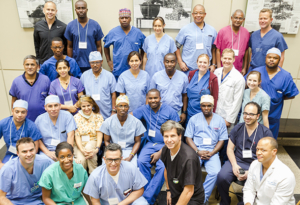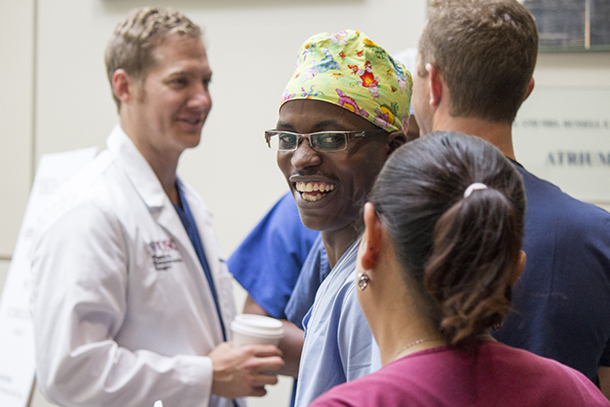Nearly two dozen doctors from around the world visited the Keck School of Medicine of USC recently to enhance their medical skills and learn new surgical techniques.
The group of physicians was part of a larger contingent of Operation Smile-credentialed surgical volunteers, which brought more than 100 international doctors to four U.S. universities. USC’s 21 participants ranged from residents to 30-year surgical veterans from Bolivia, Egypt, Ethiopia, Ghana, India, Kenya, Morocco, Peru, Rwanda and Venezuela.
“Bringing young surgeons from around the world together to share ideas is as great for the development of a global family as it is for the advancement in medicine,” said William Magee III, MD, DDS, assistant professor of clinical surgery and director of international programs at Children’s Hospital Los Angeles.
USC faculty led the training at the Keck School of Medicine of USC Surgical Skills Simulation and Education Center, home to the largest fresh tissue dissection lab of its kind, and an accredited surgical skills training center.
Between May 19 and 21, the participants worked with USC specialists in pediatric plastic surgery, craniofacial surgery, congenital hand surgery, reconstructive surgery, breast reconstruction, microsurgery, burn surgery and abdominal and chest reconstruction.
Leading the program with Magee was Joseph Nicholas Carey, MD, assistant professor of surgery in the division of plastic and reconstructive surgery; and Justin Gillenwater, MD, burn and critical care fellow.

USC faculty and international surgeons exchanged knowledge and honed their skills in a surgical simulation training through Operation Smile, held May 19-21 at the Keck School of Medicine of USC. (Photo/Larissa Puro)
In line with Operation Smile’s evolution from a service charity to a research and education network, the training aimed to equip participants with the skills needed to operate on victims of trauma in regards to reconstruction, burns, ulcers and cosmetic procedures.
The participants benefited from 12 total hours of surgical instruction and simulation using USC’s innovative perfusion model. Using real human tissue — provided in partnership with USC’s vendor Science Care — with artificial blood flow, the surgeons practiced their skills in a realistic operating room setting.
Gillenwater, the inaugural Sue Tsao and Operation Smile Global Health Fellow, has personally benefited from trainings like this one.
“My experiences with Operation Smile highlight the importance of collaboration and education in global health,” he said. “The idea of always trying to improve yourself and those around you, whether as a mentor or student, has influenced me to prioritize surgical education as a concept in global health work.”
The course encouraged surgeons to take advantage of each other’s knowledge and experience, a vital opportunity for surgeons whose countries have few — if any — similarly specialized physicians. Rwanda, for example, has just one plastic surgeon in the entire country.
Since 2007, the Keck School’s division of plastic surgery has conducted international programs similar to this simulation. This year, the university partnered with Operation Smile as part of both organizations’ commitment to helping fill the global gap in access to safe, well-timed surgeries by providing training to local medical personnel in low- and middle-income countries. This investment by both Operation Smile and the Keck School is designed to promote the future growth and sustainability of local health systems.
Additionally, the USC Institute for Global Health, Operation Smile and Children’s Hospital Los Angeles, offer annual research fellowships to USC scholars who assist in researching the genetic and environmental factors in the etiology of oral clefts in children as part of the Operation Smile International Family Study.
Operation Smile is an international medical charity that has provided hundreds of thousands of free surgeries for children and young adults in developing countries who are born with cleft lip, cleft palate or other facial deformities. It is one of the oldest and largest volunteer-based organizations dedicated to improving the health and lives of children worldwide through access to surgical care.
— Larissa Puro


